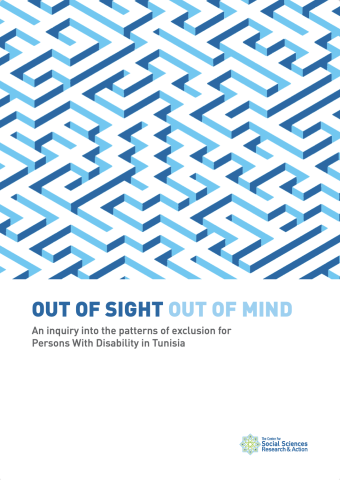Out of sight out of mind. An inquiry into the patterns of exclusion for Persons With Disability in Tunisia | غائبون عن الأنظار. دراسٌة حول أنماط إقصاء الأشخاص ذوي الإعاقة في تونس

This report discusses the definition of disability in the Tunisian legislative framework by contextualizing it within the broader international and historical debate. It provides an overview of the main regulations of the Tunisian legislative framework on disability, pointing out its legal and practical shortcomings and their impact on the accomplishment of social justice principles in the disability landscape. On the one hand, this study argues that although the Tunisian legislation related to disability is often hailed as one of the most advanced in the Middle East and North Africa (MENA) region, its model remains oriented towards an outdated medical approach. On the other hand, it provides a qualitative assessment of the gap between the legislation and the reality of its implementation by focusing on an analysis of the education system. We conclude by advancing some remarks on the PWDs-related social protection policies and on PWDs limited inclusion in the labour market.
Overall, this report aims to provide a qualitative assessment of the disability framework in Tunisia from a social justice perspective. By giving evidence-based insights of the reality of disability, it highlights the practical dynamics of discrimination and exclusion limiting PWDs citizenship, or more prosaically, their ability to fully participate in the social, economic and political life on equal basis with others.
يناقِش التقرير تعريف الإعاقة في الإطار التشريعي التونسي من خلال وضعه في سياق الجدلية الدولية والتاريخية على نطاقٍ أوسع. تُقدّم الورقة لمحةً عامةً عن الأنظمة الرئيسية المتعلقة بالإعاقة التي ينص عليها الإطار التشريعي التونسي، وتحدد أوجه القصور القانونية والعملية وتأثيرها على تحقيق مبادئ العدالة الاجتماعية في سياق الإعاقة. تُفيد هذه الدراسة، من جهة، بأنَّ القوانين التونسية المتعلقة بالإعاقة تُعتبر غالبًا من الأكثر تقدمًا في منطقة الشرق الأوسط وشمال أفريقيا، إلّا أن نموذجها يبقى موجهًا نحو نهج طبي قديم العهد. وتستعرض من جهة أخرى تقييمًا نوعيًا للفجوة بين القوانين وتنفيذها على أرض الواقع من خلال التركيز على تحليل النظام التعليمي. ونَختتِم بطرح بعض الملاحظات حول سياسات الحماية الاجتماعية المتعلقة بالأشخاص ذوي الإعاقة وحول الإدماج المحدود في سوق العمل.
فتساهم هذه الدراسة في تقديم تقييم نوعي لإطار الإعاقة في تونس من منظور العدالة الاجتماعية. ومن خلال الإضاءة على واقع الإعاقة بواسطة الأدلّة والقرائن العلمية، تبرز ديناميات التمييز والإقصاء العملية التي تحدّ من مُواطَنة الأشخاص ذوي الإعاقة أو ببساطة تحد من قدرتهم/نّ على المشاركة الكاملة في الحياة الاجتماعية والاقتصادية والسياسية على قدم المساواة مع الآخرين.

